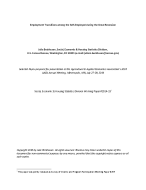Employment Transitions among the Self-Employed during the Great Recession
Employment Transitions among the Self-Employed during the Great Recession
Abstract
Entrepreneurs base their decision to start a business on a range of factors, from age, education and assets to macroeconomic conditions. While the majority of these factors have a well-understood impact on entering and exiting self-employment, the effect of macroeconomic conditions is less clear. During periods of recession, self-employment may increase due to its attractiveness as an alternative to unemployment. However, the difficulty of maintaining a business through the downturn can lead to a decrease in the self-employed. Understanding the transitions in and out of self-employment would help us better appreciate how entrepreneurs experience recessions. We use a robust set of longitudinal data from the Survey of Income and Program Participation (SIPP) to analyze the movements between self-employment, unemployment and wage-work during the Great Recession. The results suggest that the probability of entering self-employment depends on characteristics of the individual while movements out of self-employment are contingent on characteristics of the business. Furthermore, transitions from unemployment to self-employment increased during the recession months and transitions from self-employment to wage-work increased in the post recession months .





